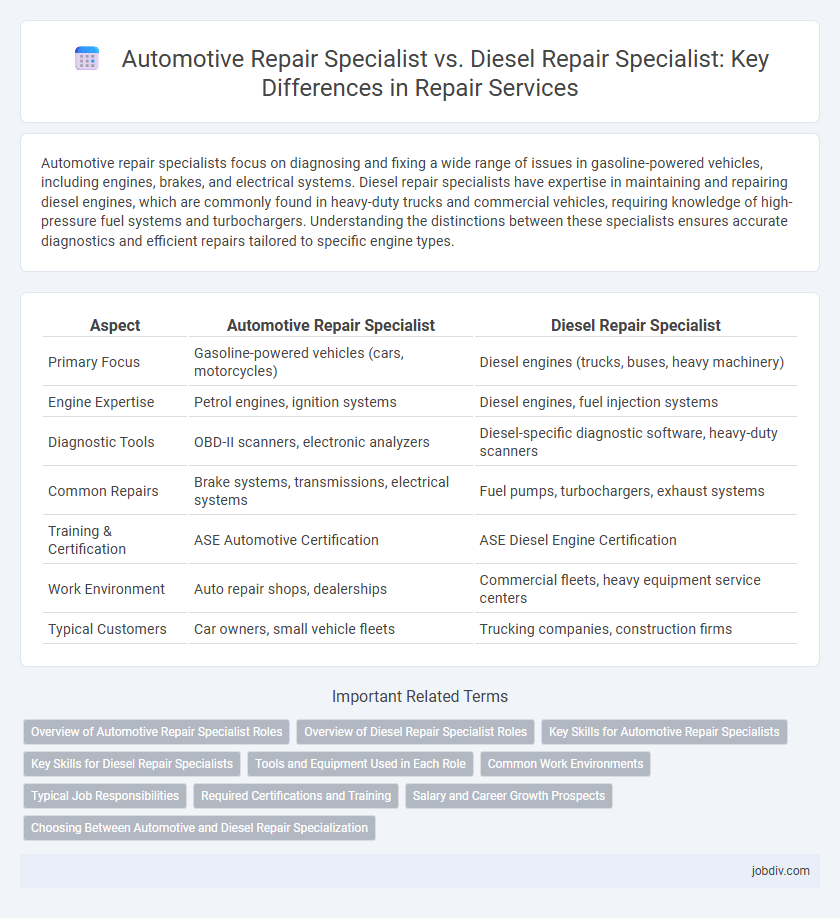Automotive repair specialists focus on diagnosing and fixing a wide range of issues in gasoline-powered vehicles, including engines, brakes, and electrical systems. Diesel repair specialists have expertise in maintaining and repairing diesel engines, which are commonly found in heavy-duty trucks and commercial vehicles, requiring knowledge of high-pressure fuel systems and turbochargers. Understanding the distinctions between these specialists ensures accurate diagnostics and efficient repairs tailored to specific engine types.
Table of Comparison
| Aspect | Automotive Repair Specialist | Diesel Repair Specialist |
|---|---|---|
| Primary Focus | Gasoline-powered vehicles (cars, motorcycles) | Diesel engines (trucks, buses, heavy machinery) |
| Engine Expertise | Petrol engines, ignition systems | Diesel engines, fuel injection systems |
| Diagnostic Tools | OBD-II scanners, electronic analyzers | Diesel-specific diagnostic software, heavy-duty scanners |
| Common Repairs | Brake systems, transmissions, electrical systems | Fuel pumps, turbochargers, exhaust systems |
| Training & Certification | ASE Automotive Certification | ASE Diesel Engine Certification |
| Work Environment | Auto repair shops, dealerships | Commercial fleets, heavy equipment service centers |
| Typical Customers | Car owners, small vehicle fleets | Trucking companies, construction firms |
Overview of Automotive Repair Specialist Roles
Automotive repair specialists are skilled technicians who diagnose, maintain, and fix a wide range of vehicle systems including engines, transmissions, brakes, and electrical components in cars and light trucks. They use advanced diagnostic tools and software to identify issues and perform routine maintenance such as oil changes, tire rotations, and brake repairs. Their expertise covers gasoline-powered engines and hybrid vehicles, differentiating them from diesel repair specialists who focus on heavy-duty diesel engines in trucks, buses, and industrial equipment.
Overview of Diesel Repair Specialist Roles
Diesel repair specialists focus on maintaining and fixing diesel engines used in heavy-duty trucks, buses, and industrial equipment, requiring advanced knowledge of fuel injection systems, turbochargers, and emission controls. Their expertise includes diagnosing mechanical, electrical, and electronic issues specific to diesel engines, ensuring optimal engine performance and compliance with environmental regulations. Unlike general automotive repair specialists, diesel repair technicians work primarily with larger vehicles and more complex engine systems, demanding specialized tools and training.
Key Skills for Automotive Repair Specialists
Automotive repair specialists excel in diagnosing and fixing issues related to gasoline engines, electrical systems, brakes, and suspension components, emphasizing proficiency in computerized diagnostics and engine performance tuning. Their skill set includes expertise in hybrid and electric vehicle systems, allowing them to address modern automotive technologies beyond traditional combustion engines. Diesel repair specialists focus more on heavy-duty engine mechanics, fuel injection systems, and emissions controls specific to diesel-powered vehicles, highlighting different technical competencies tailored to commercial and industrial applications.
Key Skills for Diesel Repair Specialists
Diesel repair specialists excel in advanced diagnostic techniques, heavy machinery maintenance, and engine rebuilding, focusing on diesel engines' unique fuel systems and emission standards. Their key skills include expertise in turbochargers, fuel injection systems, and electronic control modules specific to diesel-powered vehicles. Proficiency in handling trucks, buses, and industrial equipment sets diesel repair specialists apart from automotive repair specialists.
Tools and Equipment Used in Each Role
Automotive repair specialists primarily utilize diagnostic scan tools, computerized wheel alignment machines, and hydraulic lifts designed for passenger vehicles, enabling precise repairs on engines, brakes, and electronic systems. Diesel repair specialists rely on heavy-duty tools such as diesel engine analyzers, particulate matter testers, and high-torque impact wrenches tailored for large trucks and industrial machinery maintenance. Both roles require specialized diagnostic equipment, but diesel specialists often handle more robust and high-powered instrumentation due to the complexity and size of diesel engines.
Common Work Environments
Automotive repair specialists typically work in garages, dealerships, or service centers that handle passenger vehicles, focusing on engines, brakes, and electrical systems. Diesel repair specialists operate in environments such as truck fleets, heavy equipment yards, or industrial maintenance facilities, where they troubleshoot and repair diesel engines. Both roles require access to diagnostic tools and collaboration with service teams, but their work environments differ primarily by vehicle type and industry demands.
Typical Job Responsibilities
Automotive Repair Specialists diagnose, maintain, and repair gasoline-powered vehicles, focusing on engine systems, brakes, transmissions, and electrical components. Diesel Repair Specialists specialize in the maintenance and repair of diesel engines, including heavy-duty trucks and machinery, addressing fuel injection systems and turbochargers. Both roles require expertise in diagnostic tools, but Diesel Specialists often manage more complex engine components due to the nature of diesel technology.
Required Certifications and Training
Automotive Repair Specialists typically require ASE certifications such as ASE Certified Automotive Technician and State-specific licenses, with training in gasoline engine diagnostics and vehicle electrical systems. Diesel Repair Specialists need specialized certifications like ASE Medium-Heavy Truck Certification and EPA Section 609 certification, along with comprehensive training on diesel engine mechanics and emission controls. Both roles demand ongoing education to stay current with evolving vehicle technologies and repair standards.
Salary and Career Growth Prospects
Automotive repair specialists earn an average salary ranging from $40,000 to $60,000 annually, with steady demand driven by the constant need for maintenance of gasoline-powered vehicles. Diesel repair specialists typically command higher salaries, often between $50,000 and $70,000 per year, due to the specialized knowledge required for heavy-duty trucks and machinery. Career growth for diesel repair specialists is robust, supported by increasing use of diesel engines in commercial transport and logistics sectors, while automotive repair specialists benefit from broader opportunities across personal and commercial vehicle sectors.
Choosing Between Automotive and Diesel Repair Specialization
Choosing between an automotive repair specialist and a diesel repair specialist hinges on the types of vehicles serviced and engine expertise required. Automotive repair specialists focus on gasoline-powered cars and light trucks, handling systems like fuel injection, emissions, and electronic diagnostics. Diesel repair specialists concentrate on heavy-duty trucks, commercial vehicles, and diesel engines, mastering components such as turbochargers, fuel pumps, and exhaust after-treatment systems.
Automotive Repair Specialist vs Diesel Repair Specialist Infographic

 jobdiv.com
jobdiv.com